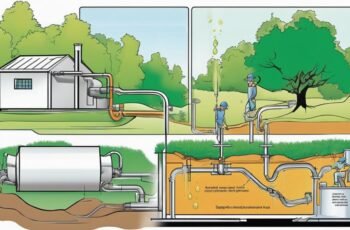Septic tank cleaners with beneficial bacteria break down waste materials like fats and accelerate decomposition of solid waste, reducing the need for frequent pump-outs. By enhancing waste digestion, these products optimize system performance, decreasing the pumping frequency. Factors such as proper maintenance, household size, and bacterial balance influence how often pumping is required. By supporting beneficial bacteria, these cleaners help maintain a healthy septic tank ecosystem and extend the time between pump-outs. Understanding these mechanisms can help you make informed decisions about the care of your septic system and its long-term efficiency.
Key Takeaways
- Utilizing septic tank cleaners with beneficial bacteria can break down waste and reduce pumping frequency.
- Proper maintenance practices and bacterial balance support cleaner effectiveness in extending time between pump-outs.
- Cleaner products accelerate decomposition, optimize system performance, and decrease the need for frequent pump-outs.
- Studies show that septic tank cleaners can help maintain a healthier bacterial balance and extend time between pumpings.
- Consistent preventative maintenance, mindful drain usage, and avoiding non-biodegradable items contribute to reducing pumping frequency.
How Septic Tank Cleaners Work
When considering how septic tank cleaners work, it is essential to understand the mechanisms behind their effectiveness in reducing the frequency of pumping. These cleaners operate by utilizing a blend of beneficial bacteria that facilitate the breakdown of organic matter within the septic system. Through a process known as bacterial breakdown, these specially selected microbes target waste materials, such as fats, oils, grease, and solid waste, accelerating their decomposition.
The key to their efficiency lies in waste digestion. By enhancing the natural biological activity in the tank, septic tank cleaners promote the breakdown of complex compounds into simpler forms that can be more easily processed by the system. This improved digestion not only helps prevent clogs and backups but also reduces the accumulation of sludge and scum, ultimately extending the time between required pump-outs.
Benefits of Using Cleaner Products
Considering the benefits of using cleaner products for your septic tank maintenance regimen, it is essential to highlight the significant advantages these solutions offer. Cleaner benefits can lead to a decrease in the frequency of pumping required for your septic tank. By utilizing specialized cleaner products, you can effectively break down organic matter and solid waste within the tank, reducing the buildup of sludge and scum. This breakdown process enhances the overall efficiency of the septic system, allowing it to operate smoothly for longer periods without the need for frequent pump-outs. Additionally, cleaner products contain beneficial bacteria and enzymes that promote the natural decomposition of waste, preventing clogs and blockages that could necessitate premature pumping. By incorporating cleaner solutions into your septic tank maintenance routine, you can optimize the system's performance and potentially extend the time between pumpings, ultimately saving you time and money in the long run.
Factors Affecting Pumping Frequency
Factors affecting septic tank pumping frequency encompass various elements that influence the accumulation of solids and sludge within the system. Proper maintenance practices play an essential role in determining how often your septic tank needs pumping. Regular inspections, timely repairs, and adherence to recommended pumping intervals are essential in preventing the build-up of solids that could lead to system failure. The size of your household also impacts pumping frequency, with larger households typically requiring more frequent pump-outs due to higher water usage. Additionally, the age of the septic system and the type of solids being flushed into it can affect how quickly sludge accumulates. By following best practices for proper maintenance and adhering to suggested pumping intervals based on household size and usage, you can help ensure optimal performance of your septic system and potentially reduce the frequency of required pump-outs, saving you time and money in the long run. SEPTIFIX's aerobic bacteria play an essential role in waste breakdown and pathogen elimination, contributing to a healthier septic system overall.
Understanding Bacterial Balance
To better grasp the dynamics within your septic tank, understanding the vital role bacteria play is essential. Bacteria aid in breaking down waste, affecting the frequency at which pumping is necessary. Examining the effectiveness of septic tank cleaners involves evaluating their impact on this delicate bacterial balance.
Bacterial Role in Tanks
Within septic tanks, the bacterial community plays a vital role in maintaining the system's functionality. The bacterial balance within the tank is necessary for breaking down organic matter and waste solids. When the bacterial population is well-maintained, it aids in the decomposition process, preventing the accumulation of sludge and scum layers. This balance directly impacts the pumping frequency of the septic tank.
An imbalance in the bacterial community can lead to inefficient decomposition, resulting in the build-up of solids and reduced tank capacity. As a consequence, the need for more frequent pumping arises to prevent system failure. By understanding the pivotal role bacteria play in the tank, you can take steps to promote a healthy bacterial balance. Using septic tank cleaners that support the growth of beneficial bacteria can help optimize the decomposition process and potentially reduce the frequency of pumping required.
Maintaining the bacterial balance in your septic tank is key to ensuring its longevity and efficient operation. By prioritizing the health of the bacterial community, you can positively impact the pumping frequency and overall performance of your septic system.
Frequency of Pumping
For a septic tank system to function at its best, the frequency of pumping is directly correlated with the bacterial balance within the tank. Pumping intervals play a pivotal role in maintaining the efficiency of your septic system. The maintenance schedule for pumping should be determined based on factors such as tank size, household size, and water usage patterns.
Regular pumping is essential to prevent solids from accumulating in the tank, which can disrupt the bacterial balance necessary for proper decomposition. Over time, if pumping intervals are too infrequent, the excess solids can lead to clogs, backups, and even system failure. It is recommended to follow a maintenance schedule that aligns with your specific household needs to guarantee optimal functionality of your septic system.
Cleaner Effectiveness Assessment
Evaluating the effectiveness of septic tank cleaners involves understanding the delicate equilibrium of bacteria within the system. Cleaner performance is vital in maintaining this balance, as it directly impacts the breakdown of waste. A well-functioning septic tank relies on a healthy population of bacteria to decompose organic matter. When considering cleaner effectiveness, it is important to assess how efficiently the product enhances bacterial activity.
The frequency of pumping intervals is directly linked to the bacterial balance within the septic tank. A high-quality cleaner can help maintain ideal bacterial levels, potentially extending the time between pump-outs. By promoting the growth of beneficial bacteria and inhibiting the growth of harmful ones, a good cleaner can contribute to the overall health of the septic system.
To determine whether a septic tank cleaner is effective, monitoring the bacterial balance over time is necessary. Conducting regular evaluations of bacterial populations and waste decomposition rates can provide valuable insights into the cleaner's performance. Ultimately, a well-balanced bacterial environment is crucial to reducing the frequency of pumping and ensuring the longevity of the septic system.
Realistic Expectations and Results
The realistic expectations and results of using a septic tank cleaner are essential to understanding its effectiveness. When considering cleaner efficiency, it is important to note that while these products can help in breaking down solids and maintaining a healthier bacterial balance in your septic system, they may not completely eliminate the need for pumping altogether. Studies have shown that certain cleaners can indeed reduce the frequency of pumping by aiding in the natural breakdown of waste, potentially extending the time between pump-outs. However, it is crucial to manage expectations and not rely solely on these products to replace regular maintenance.
Results may vary depending on factors such as the size of your tank, the number of occupants in your household, and your overall wastewater production. While septic tank cleaners can be a helpful tool in maintaining your system, it is essential to continue following best practices for septic system care and seek professional advice when needed. Remember, cleaner efficiency and pumping reduction are possible with the right products and proper system care, but they should be seen as part of a complete maintenance plan rather than a standalone solution.
Tips for Maintaining Your System
Considering the maintenance of your septic system plays a vital role in its overall performance and longevity. Preventative maintenance is important to avoid costly repairs and guarantee efficient operation. Regular tank inspection is key to identifying any issues early on. It is recommended to have a professional inspect your septic tank at least every three years, or as advised based on your household size and usage. Additionally, be mindful of what goes down your drains to prevent clogs and maintain the health of your system. Avoid flushing non-biodegradable items, grease, chemicals, and excessive amounts of household cleaners. These can disrupt the natural balance of bacteria in your tank, leading to potential malfunctions. Implementing simple habits like conserving water, spreading out laundry loads, and being cautious with garbage disposal usage can all contribute to the longevity of your septic system. By following these maintenance tips, you can secure a properly functioning septic system for years to come.

